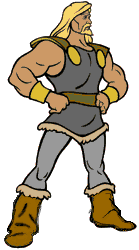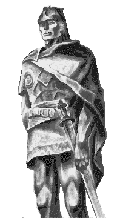History of the Epic: Beowulf

 The EPIC poem, Beowulf, is one of the oldest
existing poems written during the Anglo-Saxon period: "Its author may have
been a native of what was then Mercia, the Midlands of England today,
although the late tenth-century manuscript, which alone preserves
the poem, originated in the south in the kingdom of the West Saxons."
(The Norton Anthology 21) It was written in the early eleventh
century AD and is preserved in one text in the Cottonian collection of
manuscripts. Unfortunately, the Beowulf
manuscript was damaged in a great fire in 1731, especially the outer edges.
As a result, a number of lines and words have been lost from the poem. Luckily,
transcripts were made by the Danish scholar G.J. Thorkelin at the end of the
eighteenth century. He helped to preserve many hundreds of words from the
original manuscript. Unfortunately, this doesn't change the fact that there
are large gaps in the text as we know it. Even if the manuscript had never
been damaged, it would still be difficult to understand. Yet it still captures
the hearts of the readers, "and because of its excellence as well as its
antiquity, the poem merits the high position that it is generally assigned in
the study of English poetry."(The Norton Anthology 22)
The EPIC poem, Beowulf, is one of the oldest
existing poems written during the Anglo-Saxon period: "Its author may have
been a native of what was then Mercia, the Midlands of England today,
although the late tenth-century manuscript, which alone preserves
the poem, originated in the south in the kingdom of the West Saxons."
(The Norton Anthology 21) It was written in the early eleventh
century AD and is preserved in one text in the Cottonian collection of
manuscripts. Unfortunately, the Beowulf
manuscript was damaged in a great fire in 1731, especially the outer edges.
As a result, a number of lines and words have been lost from the poem. Luckily,
transcripts were made by the Danish scholar G.J. Thorkelin at the end of the
eighteenth century. He helped to preserve many hundreds of words from the
original manuscript. Unfortunately, this doesn't change the fact that there
are large gaps in the text as we know it. Even if the manuscript had never
been damaged, it would still be difficult to understand. Yet it still captures
the hearts of the readers, "and because of its excellence as well as its
antiquity, the poem merits the high position that it is generally assigned in
the study of English poetry."(The Norton Anthology 22)

Beowulf has great value as a representation of
ideas of Germanic culture. It gives descripition of "cultural assumptions
about kingship, social hierarchy, the place of women in the poem's society,
and the proper personal qualities for th members of the upper social ranks."
(link) The poem, tells
the deeds of the superhero, Beowulf, who is king
of the Geats; the poem talks about his battles
with an evil spirit, Grendel and his mother,
and it ends with his great fight with a fiery dragon, who threatens the
kingdom of the Geats.


An Excerpt from the Passage

Themes of the Passage

Summary of the passage

